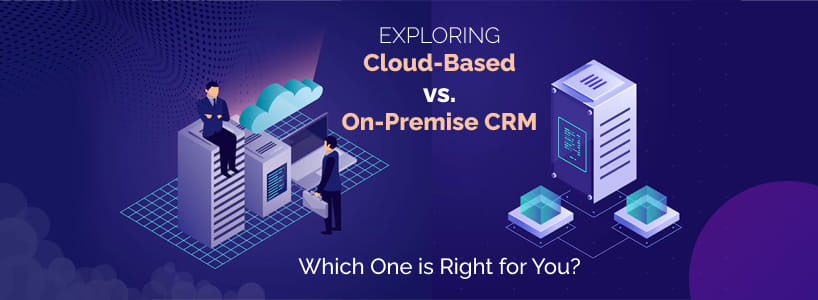Exploring Cloud-Based vs. On-Premise CRM: Which One is Right for You?

In todays competitive business environment, Customer Relationship Management (CRM) systems have become essential for managing interactions with current and potential customers. As businesses grow, choosing the right CRM solution becomes a strategic decision. The two primary options available are Cloud-Based CRM and On-Premise CRM. Understanding the key differences, benefits, and limitations of both can help you decide which one is right for your organization.
What is a Cloud-Based CRM?
A Cloud-Based CRM is hosted on the vendors servers and accessed via the internet. This means users can access the system anytime, anywhere, as long as they have an internet connection. Cloud CRMs are typically offered through a subscription model, often with monthly or annual fees.
Pros of Cloud-Based CRM:
- Accessibility: Remote teams can easily collaborate in real-time.
- Scalability: Easily scale as your business grows, without needing major infrastructure changes.
- Lower Upfront Costs: No need for physical servers or heavy IT investment.
- Automatic Updates: Vendors handle software updates and security patches.
Cons of Cloud-Based CRM:
- Recurring Costs: Long-term subscription fees can add up.
- Internet Dependency: Requires a stable internet connection for seamless access.
- Less Customization: Limited customization compared to on-premise options.
Explore our Cloud-Based CRM Solutions to see how they can support remote collaboration and business growth.
What is an On-Premise CRM?
An On-Premise CRM is installed locally on a companys own servers and maintained by its IT staff. This traditional setup gives businesses complete control over their data and infrastructure.
Pros of On-Premise CRM:
- Full Control: Total control over security, data management, and software customization.
- One-Time Cost: Usually involves a one-time licensing fee rather than ongoing subscriptions.
- Better Integration: Easier to integrate with other in-house systems.
Cons:
- Higher Initial Investment: Requires upfront capital for hardware and software.
- Limited Mobility: Remote access can be complicated to set up and maintain.
- Maintenance Burden: Internal IT teams must handle updates, backups, and security.
Learn more about Secure CRM Systems to protect customer data and ensure compliance.
Which CRM is Right for You?
The choice between cloud and on-premise CRM depends on your business needs, budget, and technical resources.
Choose Cloud-Based CRM if:
- You want flexibility and mobility.
- You have a limited IT team or infrastructure.
- Your business is growing rapidly and needs scalability.
Choose On-Premise CRM if:
- You need high customization and control.
- Data privacy and compliance are your top priorities.
- You have an experienced IT team.
Final Thoughts
Theres no one-size-fits-all answer. Both CRM types offer unique advantages. Assess your companys goals, resources, and future plans before making a decision. Whether you opt for the agility of cloud-based systems or the control of on-premise platforms, a well-implemented CRM will always enhance customer relationships and business performance.
Add a Comment
Your email address will not be published. Required fields are marked *
Categories
Popular Posts
![Customer, Lead, or Deal? Understanding CRM Sections for Smarter Sales [thumb]](https://blogimages.weblink.in/customer-lead-or-deal-understanding-crm-sections-for-smarter-sales-350x128.jpg)
Customer, Lead, or Deal? Understanding CRM Sections for Smarter Sales
![How EduAutomate Brings Real-Time Visibility to All Admin Operations? [thumb]](https://blogimages.weblink.in/how-eduautomate-brings-real-time-visibility-to-all-admin-operations-350x128.jpg)
How EduAutomate Brings Real-Time Visibility to All Admin Operations?
![How CRM Vendor Management Enhances Your Procurement Process [thumb]](https://blogimages.weblink.in/how-crm-vendor-management-enhances-your-procurement-process-350x128.jpg)